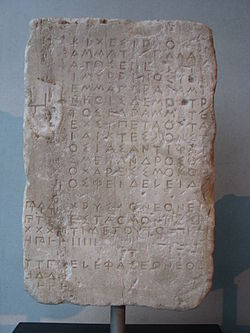Ancient Greek
Ancient Greek was an Indo-European language spoken in Ancient Greece from about 1500 BC to about 300 BC. Ancient Greek and Latin are very important languages. Although they are no longer spoken, they influenced almost all modern European languages.
| Ancient Greek | ||
|---|---|---|
| Ἑλληνική Hellēnikḗ | ||
 Inscription about the construction of the statue of Athena Parthenos in the Parthenon, 440/439 BC | ||
| Region | eastern Mediterranean | |
| Era | 9th century BC to the 4th century AD | |
| Language family | Indo-European
| |
| Writing system | Greek alphabet | |
| Language codes | ||
| ISO 639-2 | grc | |
| ISO 639-3 | grc (includes all pre-modern stages) | |
| File:Homeric Greece-en.svg | ||
|
Template:Infobox language/IPAs | ||
Greek had many different dialects.[1] Attic Greek was spoken in Athens, the largest city, and in the rest of the region of Attica. It was thought to be the purest form of Greek. Later, in the educated Roman world, children were taught Greek as a second language just as many people now learn English as their second language. Koine Greek was the common language of Greeks. It was Attic Greek mixed with several other dialects.
Homer spoke and wrote in an old dialect that was somewhat different from Attic Greek. The Iliad and the Odyssey are long poems that tell exciting stories about warfare, travel and the Greek gods. In the 5th century BC, some great plays were written by Aeschylus, Sophocles and Euripides. The Golden Age of Ancient Greece inspired literature that has been read for centuries.
Attic Greek
Attic Greek was the dialect that was spoken in Athens, the largest city, and in the rest of the region of Attica. It was the dialect that was most similar to later forms of Greek since it was the standard form of the language. It is studied in Ancient-Greek courses because it was the most common dialect.
Changes
All languages change with time, and Greek has changed a great deal over 2500 years. Modern Greek is often said to have started in 1453 AD;[2] until then, Medieval Greek was spoken.
Unlike Latin, Ancient Greek did not split into many languages, but it is still considered to be a separate language from Modern Greek. The pronunciation has changed; for instance, the letter beta was pronounced "b" in Ancient Greek but it is pronounced "v" and is called "vita" in Modern Greek. The spelling has not changed much, which gives the appearance of less change than actually happened. Also, many different vowels and diphthongs merged into "i", the vowel sound in the English word "ski". The tonal system of Ancient Greek has disappeared, but Modern Greek has only recently changed its spelling to match that change.
Despite those changes, much of the language has remarkably survived intact through the centuries.[3] A community near Trabzon, Turkey, speaks a dialect that is closer to Ancient Greek than to Standard Modern Greek.[4]

Ancient Greek Media
Ostracon bearing the name of Cimon, Stoa of Attalos
Related pages
References
- ↑ Woodard, Roger D. 2008. Greek dialects, in: The Ancient Languages of Europe. R.D. Woodard (ed) Cambridge: Cambridge University Press, p. 51.
- ↑ Nordhoff, Sebastian et al (eds) 2013. Ancient Greek (to 1453). Glottolog. Leipzig: Max Planck Institute for Evolutionary Anthropology. [1]
- ↑ Palmer, Leonard 1996. The Greek Language. Norman, OK: University of Oklahoma Press, p. 262. ISBN 0-8061-2844-5
- ↑ The Independent, 3 January 2011 Jason and the argot: land where Greek's ancient language survives
